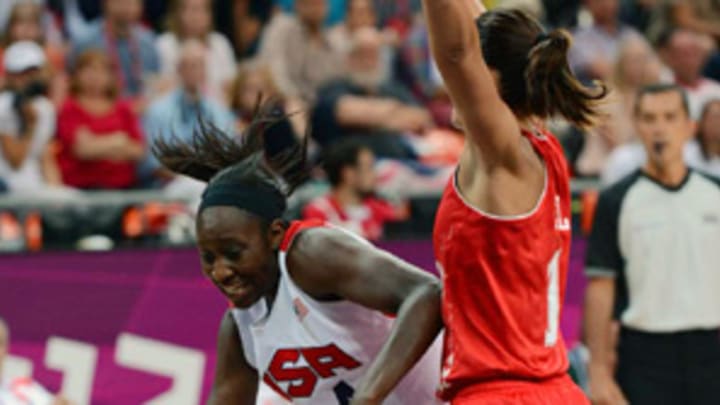U.S. women's basketball quietly on the brink of history in London


The U.S. women's basketball team is on the cusp of what may be the most impressive collective accomplishment of the London Olympics that you've never heard of. If coach Geno Auriemma's crew can win the gold medal -- and they're as overwhelming a favorite to do so as any entrant in any Olympic event -- they'll become the first to win five straight in a traditional team sport, which is to say any game in which a ball is kicked, thrown or whacked.
Why is this news likely to come as a surprise? Well, it's partly due to the long shadow of the U.S. men. Even 20 years after the Dream Team took American hoops global, the foreign media here are so enamored of LeBron, Kobe and Co. that yesterday London organizers introduced a press-need-tickets policy for U.S. men's games, lest reporters spill from venue tribunes and offend the public with their boorish manners and lousy hygiene.
Meanwhile, with the U.S. having failed to qualify in men's soccer, American eyes have turned to the women in that sport, particularly Twitter-fingered goalie Hope Solo, who seems incapable of leaving a publicity vacuum unfilled. Because of the Americans' loss to Japan in the 2010 World Cup, a Redeem Team narrative has emerged around women's soccer, and that's a more engaging storyline than the hoopsters' air of inevitability.
But as powerful as they're expected to be, Auriemma's players can't log the practice time needed to make their dominance easy. Each plays overseas for eight months, then joins her WNBA team for another three over the summer. "We had them together for three days in Seattle in May," said the coach, who has had an Olympic quadrennium to put his stamp on the U.S. program. "It's the only time in four years we've had the whole team together that long."
"Because of that lack of time together on the court," said wing Maya Moore, "we're using every practice, every shootaround, every game to come together as a team."
It helps that six of the team's 12 members, Moore included, played for Auriemma at Connecticut, over a period that stretches back 10 years. "They have a familiarity with the terminology," he said. "There's less explaining that I have to do." And with a series of late tips during Olympic pool play, Auriemma can turn game-day morning shootarounds into full-fledged workouts, knowing his charges will be fully recovered when the ball goes up at 10:15 p.m. Greenwich Mean Time.
"It's difficult defensively, because defense takes a lot of timing and coordination," he said. "International teams have become so skilled offensively that they expose you. Russia and Australia are veteran teams that make you pay for every mistake. China will have played 30 games by the time they finish these Olympics."
That lack of time together helps explain why the U.S. whooped Croatia by 54 in a pre-Games tuneup in Istanbul, only to find itself trailing the same team 23-21 in an Olympic pool play opener on Saturday. Only a 16-0 burst in the fourth quarter made for an 81-56 victory. "We've got the kinds of players who can adapt, but it's not going to look pretty every time," Auriemma said.
Things came together more quickly last night, during a 90-38 sprint past Angola. Auriemma was pleased that his Half Huskies logged an assist on 25 of their 36 baskets.
The opponent brought back memories of the Dream Team men at the Barcelona Games, where the words and elbows of Charles Barkley nearly caused a diplomatic incident.
We remember that. But we're less likely to recall that Barcelona is the last place the U.S. women lost an Olympic basketball game.
"After 1992, so many foreign [male] players came to the NBA, and the sense of awe and wonderment was gone," Auriemma said. "It's the same on this end."
Well, not entirely. After last night's game Angolan coach Anibal Moreira said, "We feel pride to be able to play against such a team, who are the idols of many of our players."
Perhaps it will take something Barcelona-esque for the world to fully appreciate the U.S. women -- something like an opponent walking up to Moore or Diana Taurasi or Candace Parker pregame to ask her to pose for a picture.
